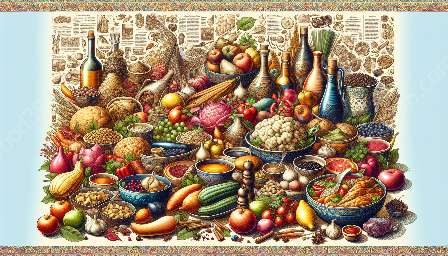Cooking has always been an integral part of human culture and continues to evolve with technological advancements and changing culinary trends. In this topic cluster, we will explore the future of cooking, including emerging trends, technological advancements, and their impact on the evolution of cooking techniques and tools, as well as its relationship to the origin and evolution of food culture.
Evolution of Cooking Techniques and Tools
The history of cooking techniques and tools dates back to ancient times, with innovations and advancements shaping the way we prepare and enjoy food. From the discovery of fire to the invention of sophisticated kitchen appliances, the evolution of cooking techniques and tools has been revolutionary.
In the modern era, we are witnessing a rapid transformation in cooking techniques and tools, driven by digitalization, automation, and sustainability. The rise of smart kitchen gadgets, precision cooking equipment, and eco-friendly cookware reflects a shift towards convenient, precise, and environmentally conscious culinary practices.
As technologies such as artificial intelligence and Internet of Things (IoT) continue to integrate into our everyday lives, we can expect cooking techniques and tools to become more connected, efficient, and personalized. From smart ovens that can be controlled remotely to robotic kitchen assistants that aid in food preparation, the future of cooking is poised to be streamlined and user-centric.
The Future of Cooking: Trends and Advancements
Emerging trends in the culinary world are shaping the future of cooking in exciting and innovative ways. Plant-based cuisine, sustainable sourcing, and food waste reduction are driving forces behind the transformation of traditional cooking practices. With an increasing emphasis on health and environmental consciousness, consumers are turning towards alternative ingredients and cooking methods.
Advancements in food technology, such as 3D-printed food, lab-grown meat, and personalized nutrition, are pushing the boundaries of culinary creativity and nutritional science. The concept of personalized meal planning and print-on-demand food production signifies a future where food preparation is tailored to individual preferences and dietary needs.
Furthermore, the fusion of culinary arts with virtual and augmented reality presents a new dimension to the dining experience. Virtual cooking classes, immersive dining simulations, and augmented reality menus are redefining how we interact with food and cooking, creating an immersive and educational culinary journey for enthusiasts and professionals alike.
Origin and Evolution of Food Culture
Understanding the future of cooking requires an exploration of its origin and evolution within the rich tapestry of food culture. The traditions, rituals, and social dynamics surrounding food have shaped the way we perceive, prepare, and consume meals throughout history.
From ancient agricultural societies to globalized culinary landscapes, the evolution of food culture has been influenced by migration, trade, colonization, and technological advancements. The fusion of diverse culinary traditions has given rise to a global pantry of ingredients, flavors, and cooking styles, enriching the tapestry of food culture with a mosaic of influences.
Today, as we navigate an era of unprecedented connectivity and cultural exchange, the future of food culture is characterized by diversity, inclusivity, and cross-cultural culinary collaborations. The exploration and integration of traditional and indigenous cooking practices into mainstream gastronomy highlight a renaissance of culinary appreciation and cultural preservation.
In conclusion, the future of cooking is an amalgamation of progressive trends, technological advancements, and the continued evolution of food culture. As we embrace the potential of innovative cooking techniques, tools, and culinary trends, we also honor the diverse roots of food culture that have contributed to the global tapestry of culinary arts and traditions.


